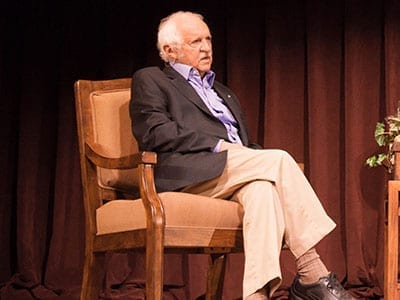
DR. LEO GOLDBERGER
Eye Witness to Danish Courage
Leo Goldberger was born on June 28, 1930 in Vukovar, Yugoslavia (now part of Croatia), as the second of what would eventually be four sons to Eugene and Helen Goldberger. Leo’s father was the cantor, the person who leads the congregation in prayer along with the rabbi, at the local synagogue and Leo’s mother was a homemaker. In 1932, Leo’s father accepted the position of cantor at a synagogue in Troppau, Czechoslovakia. After living in Troppau for two years, Leo’s father became concerned for his family’ safety when Hitler and the Nazis came to power in neighboring Germany. Consequently, in 1934, when Leo was four years old, the family moved to Denmark where his father became the cantor of an orthodox synagogue in Copenhagen.
Leo’s brother Gustav was born in 1934 and his brother Eric was born in 1938. Leo’s childhood was filled with memories of school with his friends and joyful holiday dinners with his family. This peaceful life was abruptly interrupted in the early morning hours of April 9, 1940 when the drone of German warplanes awakened the family and the sky was filled with leaflets announcing the German invasion of Denmark. Within hours, German tanks and soldiers filled the streets of Copenhagen and a sense of dread and panic spread through the city.
Later that day, Denmark’s king, Christian X, made a radio broadcast urging Danish citizens to remain calm, to carry on their usual daily routine, and to obey the German soldiers. Although the Danish Jews were uneasy after the German occupation, King Christian X and the Danish government reassured the Danish Jews that they would be treated no differently by the Germans than any other Danish citizen. Indeed, the Jews of Denmark, like other Danes, led a near normal life from 1940 until the late summer of 1943.
On August 29, 1943, the Nazis dismissed the Danish government, imposed martial law, and began to arrest prominent Danish citizens. At 4 AM the next morning Leo vividly remembers German soldiers knocking loudly on the family’s front door. Frozen by fear, Leo’s father did not open the door. The German soldiers left after a neighbor informed the soldiers that the Goldberger family was not at home. Later Leo’s father would learn that the rabbi of his synagogue had been arrested that same night.
Certain that the Germans would now search for and deport all Jews, Leo’s father decided to leave Copenhagen with his family for the safety of the countryside. For the next three weeks the Goldberger family hid until the danger of deportation passed and life seemed to have returned to normal. By the end of September the Goldberger family was back at their home in Copenhagen and Leo’s father was preparing for the upcoming Jewish High Holy Days at the synagogue. On the morning of September 29, 1943 word spread throughout Copenhagen that the Germans were going to ‘round up’ and deport the Jews of Denmark and that all Jews should leave their homes and hide.
The Goldberger family immediately packed a few belongings and headed for the countryside seeking a way to reach the safety of Sweden. Not long after reaching the coast of Denmark, Leo’s father discovered that it would take a considerable sum of money to hire a boat to take his family to Sweden. Since he did not have enough money, Leo’s father decided to return to Copenhagen to borrow or raise the money from friends. On his way back to Copenhagen on the train, Leo’s father met a woman who he would later describe as his ‘angel’. This Christian woman, Fanny Arnskos, recognized Cantor Goldberger from a prior charity recital and offered to help the Goldberger family.
“Angel’ Fanny kept her promise. She gave Leo’s father the name of a Lutheran minister who could help the Goldberger family. The minister, Henry Rasmussen, gave Leo’s father the name of a fisherman who would ferry the Goldberger family to Sweden and then the minister gave Leo’s father 20,000 Danish kroner (a sum that today would be equivalent to $50,000). Of interest, after the war, Leo’s father would seek out the Minister Rasmussen to repay the debt but the minister refused to accept any payment for having helped the Goldberger family.
On the evening of October 2, 1943 near the small village of Drageor, the Goldberger family waited anxiously on the beach for the signal from the fisherman. Upon seeing the signal, they waded out to the boat and were hidden in the hold under netting and canvas. Some hours later they transferred to a Swedish fishing boat and on to Sweden. The Goldberger family lived in Sweden until the end of the war at which time they returned to Copenhagen.
Although the Nazi danger had passed, Leo’s father worried about the threat from the Soviet Union and was also despondent over the loss of his relatives in Eastern Europe. In 1947, he moved his family to Montreal Canada. Leo earned his BA degree from McGill University in Canada in 1951 and then earned his Ph.D. in psychology from New York University in 1958. In 1959 Leo became a U.S. citizen. Recognized as a leader in the fields of sensory deprivation, stress, and coping, Leo had a successful career in academics, retiring as a Professor Emeritus of Psychology at New York University.
Leo was awarded The Order of Dannebrog (Knight’s Cross) by Queen Margrethe II of Denmark in 1993, has served as a consultant to several Holocaust resource centers, and edited the book, The Rescue of the Danish Jews: Moral Courage Under Stress. Leo and his wife of 44 years, Nancy, live in Massachusetts and have a grown daughter, Jessica, who is a professor of Agriculture and Food Sciences at Washington State University in Pullman, Washington.
